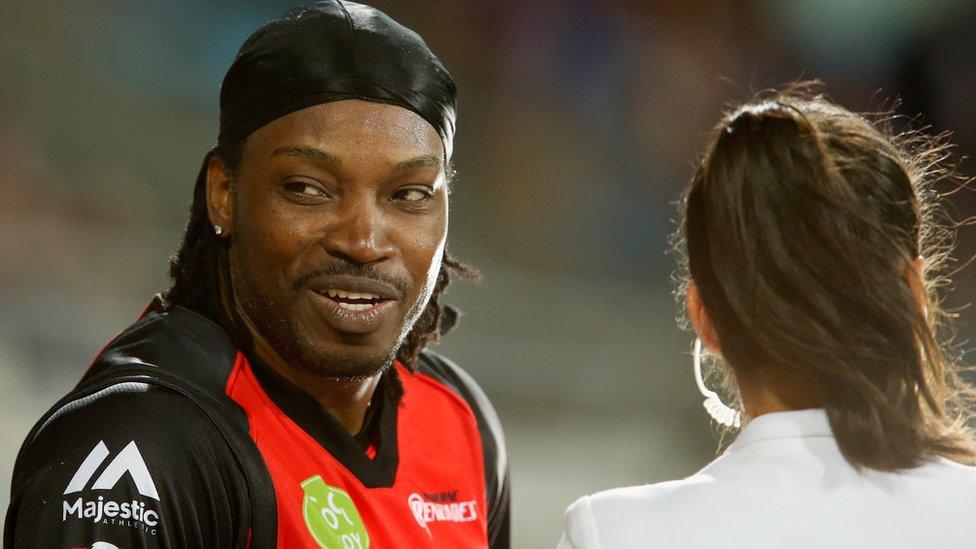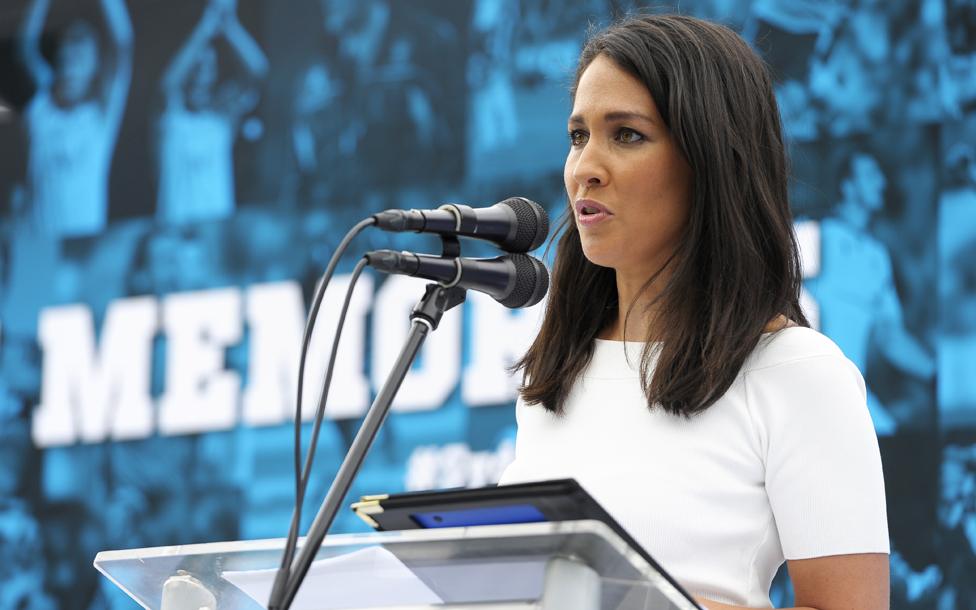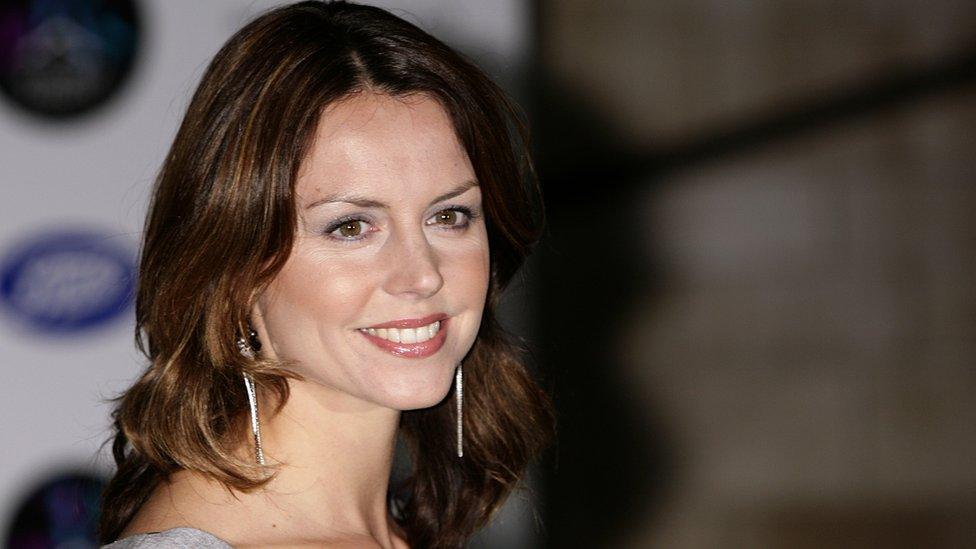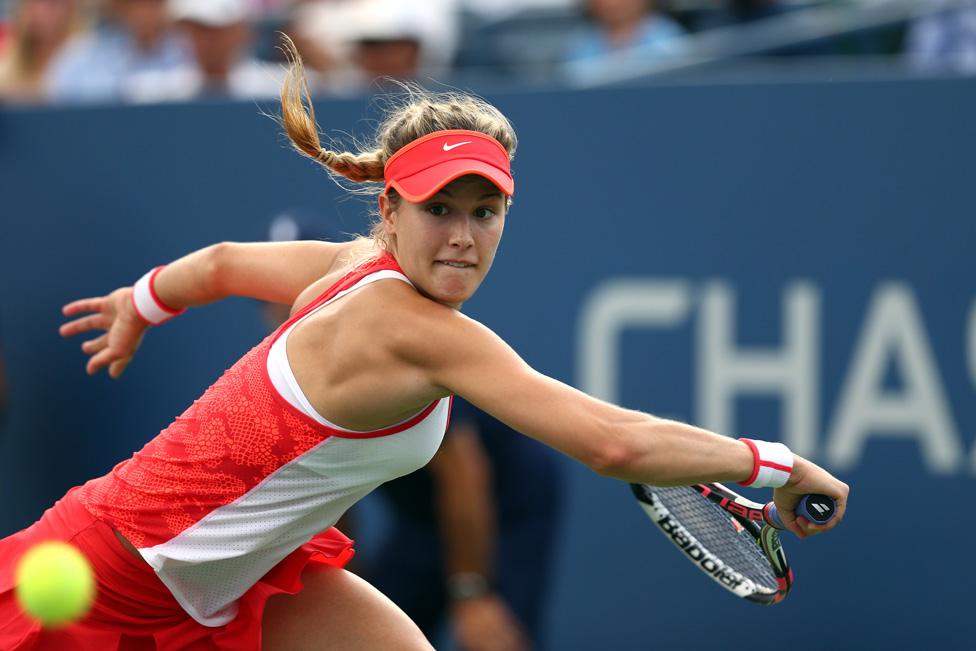What does the Chris Gayle row reveal?
- Published

A West Indies cricketer has sparked a sexism row after asking a TV reporter for a date live on air. But what does this reveal about the challenges facing female sports journalists?
Chris Gayle has faced a barrage of criticism after his comments to Mel McLaughlin during a Big Bash League match in Australia. "To see your eyes for the first time is nice," he said, in response to a question about his innings. "Hopefully we can have a drink afterwards. Don't blush baby."
His behaviour has provoked strong reactions online. Some have supported him, saying that his comments were clearly a joke. Others have condemned him as a sexist. Gayle has apologised since the incident with McLaughlin but also said that he thought the backlash had been "out of proportion".

Sports presenter Mel McLaughlin speaks on stage at a Sydney FC event
Others argue that his attitude is just another example of the types of problems faced by female sports reporters on a daily basis. They say that in the male-dominated world of sport, difficult interviews with players are common.
"They're not listening to you, which is the ultimate disrespect," says author and LBC presenter Beverley Turner who worked as a sports reporter for ITV. She remembers a particularly awkward interview, external in the locker room with now-retired basketball player Shaquille O'Neal in 2000.
"I'm there with my microphone, I'm trying to string together a decent interview, that sort of environment was already quite intimidating," she says. But O'Neal was more interested in her than in answering the questions.
"Forget the game. Let's talk about our marriage - me and you," he replied. Turner says that at the time she tried to make light of it. "But when I watched it recently I just felt so sorry for my 26-year-old self."
The result is a no-win situation for a female presenter, she says. She would have been criticised for playing along with him and "if I'd have been offended I would have been accused of being po-faced".

Beverley Turner: Women presenters are under pressure not to look "po-faced"
There is also pressure put on female journalists to look a certain way when they are reporting. "I once did a job where I had my hair up in a ponytail," says sports presenter Charlie Webster. "I was told that I should take it down for the television and that I needed to look more feminine and more glamorous."
She says that the environment can often be intimidating and that this is not acceptable. "Just because it's on television, it doesn't make it any different to any other workplace," she says.
The locker room interview has often caused problems for female reporters. But it's not always the players who are to blame. Three female journalists were denied access , externalto a NFL locker room last year. "This guy was an usher and apparently not aware that women cover sports," tweeted journalist Graham Watson after the incident.
The press box can be as male-dominated as the locker room. Journalist Russell Jackson has written, external about his shock at seeing another reporter switching between his match report and pornography on a computer in full view of other reporters.
Tennis player Eugenie Bouchard was asked to give a twirl during an on-court interview at the Australian Open a year ago. And John Inverdale was taken to task for his comments about Marion Bartoli's appearance at Wimbledon in 2013. In 2011, Richard Keys resigned, external as a Sky presenter after he made sexist comments about female referee Sian Massey.

"I'm quite used to being the only woman in the press box at a match but sometimes it has been a battle past both blatant and inadvertent sexism to get there," says BBC sports journalist Sonia Oxley.
Waiting to go through the door marked "Press Entrance" at one rugby stadium club, she was once asked "which bar are you working at?" while at a Premier League training ground she was told: "If you're waiting for autographs, love, you need to go and stand over there."
Oxley says that she has never encountered sexism from players themselves. "One even helpfully ordered the group of reporters who were crushing me against a barrier in the 'mixed zone' to step back." But she was surprised when - at a match in Moscow 10 years ago - she was greeted by a fellow reporter with the words: "Why have they sent a woman to cover this?"
She says she has never felt angry or even particularly offended by this kind of comment. "I suppose I just wonder why female sports reporters are still seen as slightly out of place."
Despite experiences such as this, Turner says that most of the journalists she has worked with have been extremely supportive. "I think the male journalists could often see the position that the women are in."
The behaviour of fans varies considerably. The BBC's Natalie Pirks has written about her experiences of football fans chanting sexually obscene questions at her during live broadcasts.
Cricket writer and broadcaster Lizzy Ammon says that a lot of the abuse comes through social media. She has had threats of violence, rape and even one threat against her son.
"You become a little bit immune to it because it's almost sadly predictable. The fact that it's there all the time does have an effect - it does make you sometimes think 'I'm not going to tweet that or say that on air' because I know inevitably what will come back at me."
But Ammon says that things are changing. There are a lot more women involved in cricket than there used to be. When working on her first international match, she says she saw three women - one other journalist and an England and Wales Cricket Board official - and more than one hundred men.
Today women are more visible in leadership positions in sport. There are also more men who are willing to call out inappropriate behaviour, Ammon adds.
"There have been some pretty strong pieces by men saying 'this is completely unacceptable and it's the responsibility of men to do something about this'."
Turner agrees that the situation has improved, thanks to female journalists who have blazed a trail. "These people have done a really good job of taking the novelty value out of female presenters in sport."
Despite the changes, there are those who argue that more needs to be done. "It has changed but I still think there is a long way to go," says Webster. "One of the things I'm really proud about is that people are now speaking out about it."
Gayle himself continues to have many defenders. It's been pointed out that tennis player Maria Sharapova flirted in a similar fashion, external with a male journalist without drawing any criticism.
But this week's episode is not the first time that Gayle has been in trouble over his behaviour to female journalists.
During a press conference ahead of a match he was asked by a female journalist: "How does the pitch feel so far in terms of the training and the weather?" He responded: "Well, I haven't touched yours yet so I don't know how it feels."
He'll be expected to be more strait-laced in his interview responses from now on.
Additional reporting by Harry Low
Subscribe to the BBC News Magazine's email newsletter, external to get articles sent to your inbox.